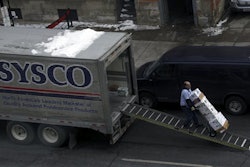MILWAUKEE (AP) — Top-selling frozen pizza brand DiGiorno and its cheese supplier cut ties with a Wisconsin dairy farm Tuesday after an animal rights group released undercover video showing workers beating, kicking, stabbing and whipping sick and injured cows.
Wiese Brothers Farm owner Mark Wiese told The Associated Press that he fired two employees and assigned another to duties that don't involve handling animals after seeing the video. Wiese, who owns the 5,000-cow farm in Greenleaf with his brother, said he was not aware of the abuse until late last month.
"My brother and I and our families are just very, very shook up about the whole incident," he said Tuesday. "And we're just going to continue to complete our investigation and make sure changes are made if needed and make our business stronger and better."
The farm sold its milk to Foremost Farms. Foremost supplies cheese to DiGiorno, which is owned by Nestle USA. Nestle said in a statement that it had asked Foremost Farms not to send it cheese made from Wiese Brothers Farm milk. Foremost Farms said it had stopped buying from Wiese Brothers on Monday.
Wiese Brothers also faces an investigation by the local sheriff's department. A captain there said he couldn't comment on the details.
An activist with Mercy For Animals shot the video while working on the farm in October and November, said Matt Rice, the group's director of investigations. Clips show cows that can't stand being dragged with ropes and heavy equipment or lifted with clamps. Workers whip, kick and stab other cows to get them moving. One animal bleeds from cuts in its side; another bleeds from its rear.
Since 2012, the 5,000-cow farm has required employees who handle animals to review and sign its humane treatment policy as part of the hiring process. Typically, that would be about seven of the farm's 45 dairy workers, Wiese said. The farm also provides training for workers who are caring for sick animals.
Since seeing the video, the farm has taken additional steps to ensure proper treatment, including calling a supervisor to oversee care when an animal goes down and designating three workers as specialists in caring for cows too sick or injured to stand.
Wiese, a second-generation dairy farmer, said he's not sure what led to the abuse.
"I can't put myself in their state of mind at the time of these incidents and everything like that, and that's all stuff that's going to have to come out as we continue to investigate," he said. However, he added: "It touched a nerve with everyone in the dairy."
Ari Solomon, a spokesman for Mercy For Animals, said while the farm might present the abuse as the actions of a couple of employees, his group has seen similar violence at five other dairy and veal farms where it has done investigations since 2009.
"The best thing people can do to stop abuse on dairy farms is not eat dairy," said Solomon, whose group advocates a vegan diet.
Short of that, he called on Nestle to adopt an animal welfare policy that would specifically bar such actions as dragging cattle that can't walk, hitting and kicking animals and using electric-shock devices. Nestle has an animal welfare policy that recognizes animals' right to be free from fear, distress, pain and injury, among other things.
"We will not knowingly work with companies that violate" that policy, spokeswoman Deborah Cross said.
Chris Booth, a veterinarian whose practice focuses on dairy animals, said sick cows should be helped to their feet using straps or gentle rocking. If they can't stand, a sled or mat can be used to move them to a soft surface, such as sand and straw, while they recover.
Using hooks to lift cows in the air and hitting or kicking a cow to get it moving isn't defensible, said Booth, the president of the Wisconsin Veterinary Medical Association.
Foremost Farms, a cooperative owned by the 1,800 farms in seven states that supply it, had an independent auditor visit the farm soon after it learned of the allegations.
"While they noted a few areas for improvement, their overall analysis indicated our animals are clean, well cared for and treated appropriately by employees," the farm said a statement.
Joan Behr, a spokeswoman for Foremost Farms, said she generally agreed with that but said the company still had to take action.
The video "certainly has an impact on consumer confidence in dairy handling practices," she said. "We need to show these activities are not something we condone."
Wiese said the farm is working on finding a new buyer for its milk.






















